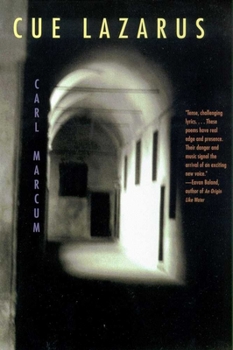Cue Lazarus
A '77 Pinto. Two boys "a few months from their driver's license." And in the back seat, a ghost of the present observing this scene refracted by memory. In this collection of poetry by Carl Marcum, a young man traces his rise to consciousness, his coming of age in the Southwest as a medio, an individual of mixed race. Displaying his Hispanic heritage as fact, emblem, and music in his poems, Marcum balances hip humor with larger themes of loss and reinvention to paint a work of seriousness and imagination, wrestling sense from the giddy rush of experience. The lead poem, "Cue Lazarus," conveys the sense of loss that permeates the collection, revisiting time the author spent with a friend he now knows will die. It sets the tone for the explorations to follow as the poet haunts his past: death, traumatic experience, the uneasiness that comes from being unable to forestall tragedy, all combine to create a sense of paradox, that he who endures becomes a ghost compelled to haunt his own life. As poetry becomes a subtle game of language, experience is refigured as an array of possibilities; Marcum finds meaning and epiphany through close observation as he revels in images of constant motion and sustained search. Here is a suite in celebration of Chevys ("That Camaro ran nearly on machismo alone") and a prayer for breakfast ("I'd like to renounce the salt and pepper shakers / of this life. But the eggs are here / twelve lines into this poem / and getting cold"). He dreams of himself as Pancho Villa, "my poetry at the end of a pistol," and invokes the spirits of poets past, "beggars on the media of Limbo, holding shabby signs: WILL WORK FOR TRUTH ." Ultimately, Cue Lazarus is about resurrection--of the spirit, of a life, of an identity. It marks the emergence of a vital new voice that, in baring his soul, reveals lessons as old as time.
Format:Paperback
Language:English
ISBN:0816520747
ISBN13:9780816520749
Release Date:January 2001
Publisher:University of Arizona Press
Length:76 Pages
Weight:0.34 lbs.
Dimensions:0.3" x 6.0" x 9.0"
Related Subjects
PoetryCustomer Reviews
3 ratings
phenomenal debut
Published by Thriftbooks.com User , 24 years ago
Do yourself a favor and buy this book. Cue Lazarus marks the debut of a vital new poet, one who has already hit his stride. Marcum mines the richness of his mixed identity (he is the son of a Mexican woman and an Anglo man), often weaving Spanish together with English to create the basic material of his art. His poetry plunges through a network of blurred boundaries to explore fundamental human predicaments. But while Marcum explicitly roots his art in an imaginative construction of the Mexican-American experience, he slyly lays claim to a wider cultural tradition. He moves through the souls of Ezra Pound, Jay Gatsby, and Marc Antony with the same command as those of Pancho Villa, his friends, his relatives, and his many selves. William Carlos Williams famously insists that the universal exists in the particular. Carl Marcum shines intense light on particular moments of particular lives and, in the process, achieves more than a thousand volumes of presumptuous generalizations. He straddles the fault line of self-knowledge, a vantage point that offers precious insight. Cue Lazarus is a pure pleasure.
Borders & Bodies
Published by Thriftbooks.com User , 24 years ago
I was so impressed by the way Marcum is able to keep his poems accessible and conversational, intimate and complicated, formal and engaged. This is one of the best books I've had the pleasure to read in months. Marcum uses magic realism, gritty lies, prayer and confession to propel this book of poems. And make no mistake, this is a book--a narrative thread moves througout the work--and not just a random collection of poems. The voice of this poet is always true, even and musical. He moves in and through Spanish and English, between borders and bodies, along highways and pool halls. I especially appreciate his constant engagement with the political acts of self and language--it is evident that Marcum knows the responsibility of the poet, he stares it down, bears witness and finds himself singing. His "I am Joaquin," "Dreaming Pancho Villa," is both vital and fresh in the American Chicano tradition of the identity poem. A truly remarkable debut. I'm keeping my eye out for his reading tour.
"Cue Lazarus": Poetry for the Masses
Published by Thriftbooks.com User , 24 years ago
"Cue Lazarus" is a book of poetry for people who hate poetry; "Cue Lazarus" is a book of poetry for people who love poetry. It is a book filled both with stories and sensations, celebration and criticism, hope and despair. Carl Marcum tells the story of a self becoming aware of the world around him and his own power and responsibility to interpret that world. Beginning in "a seventy-seven Pinto / [on] an eastbound freeway" in the southwest and ending in a Philadelphia train station, this book is truly a journey. In between is death, love, cigarettes, bourbon, pool, road signs, fairy tales, coffee and pie, breakfast, and angels. And yet, from this amalgam emerges a voice, strong and true, sometimes wryly amused, always passionately engaged.These poems are subtly wrought, the often politically-charged content cleverly concealed beneath the lyricism of the language. But make no mistake, everything in this book is an act of both personal and political identity. The most obvious instance, "Cuando El Presidente visito a mi pueblo," claims this blatantly propagandist moment as an intensely personal experience. Other poems achieve the same goal by positioning the speaker on a very literal border between selves, between languages, between cultures."Cue Lazarus" is not just an astonishing first book of poems, it is an astonishing book. These are poems not just for the sake of poetry, but present things that can only be said as poems.





